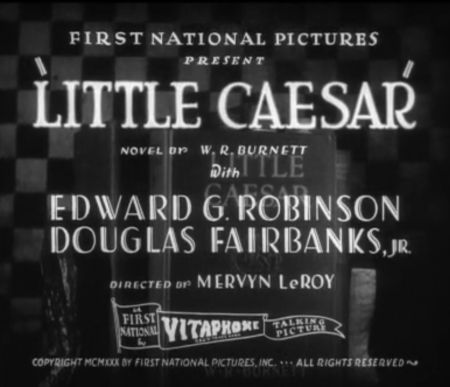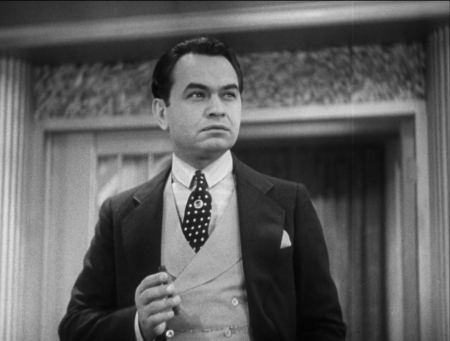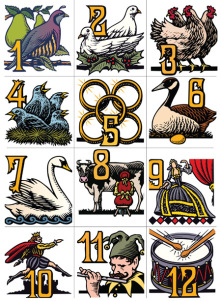
Caesar Enrico Bandello (Edward G. Robinson) — Rico for short — is tired of knocking over gas stations in his small town. He longs to be like the big-time crime bosses he reads about in the newspaper, and not just because of their impressive wealth. “Money’s all right, but it ain’t everything,” he says. “Ah, be somebody. Look hard at a bunch of guys and know that they’ll do anything you tell ’em. Have your own way or nothin’. Be somebody!”
Thus, with Joe Massara (Douglas Fairbanks Jr.), his friend and (literal) partner in crime, Rico sets out for the big city. Upon arriving there, he offers his services to boss Sam Vettori (Stanley Fields), whose nightclub is a front for his gang. Vettori agrees to let Rico join, nicknaming the diminutive man “Little Caesar” in the process, but he also reminds him that he’ll be a mere underling in this organization. “Remember, I’m the boss. I give all the orders, and when we split, we split my way, and no squawks. You get me?” he asks. “Yeah, sure, Mr. Vettori,” an eager Rico replies. Naturally, it’s not long before Rico tires of taking orders, and he quickly moves up through the ranks of the underworld, employing threats, blackmail and bullets to get what he wants — and just as quickly, it all comes crashing down.

From the very beginning of Little Caesar, directed by Mervyn LeRoy and released in 1931, it’s obvious that Rico’s quest to obtain power and glory through crime can only end badly; the opening credits are even followed by an ominous Bible verse declaring that “all they that take the sword shall perish with the sword.” Still, though the “crime doesn’t pay” message comes through clearly and many elements of the film have since become cliches of the gangster genre, Little Caesar manages to be entertaining rather than overly preachy. The brisk 78-minute run time certainly helps, giving it a pared-down quality that, at least to me, works to the movie’s advantage. I was particularly struck by a dissolve-filled montage depicting a robbery, making it seem like a nightmare from which Joe — who wants to give up crime and make an honest living as a dancer — can’t wake up.
Moreover, despite the film’s brevity, Rico is a complex, compelling character, thanks in no small part to Robinson’s performance. The viewer doesn’t know what his early years were like or how he first became involved in crime, but that information — though potentially interesting — doesn’t really matter much. What is clear is that Rico is, on one hand, cocky and self-assured, and on the other, desperate to gain power and admiration, to be important in his own eyes and in everyone else’s eyes as well. All but devoid of a conscience, he gets a thrill out of controlling people, manipulating them, abusing them, and murder is simply business to him (with one notable exception). Considering that crime bosses get their pictures splashed across legitimate newspapers — and not only when they’re arrested, but when other gangsters fete them at banquets — it’s no surprise that someone with his personality would aspire to that seemingly rewarding, even glamorous position. It’s also no surprise that his own story is presented as a cautionary tale, though it sparked a lot of imitators anyway — at least on film.

This post is part of the 2017 Blind Spot Series, hosted by The Matinee. My full list can be found here.
Advertisements Share this:




